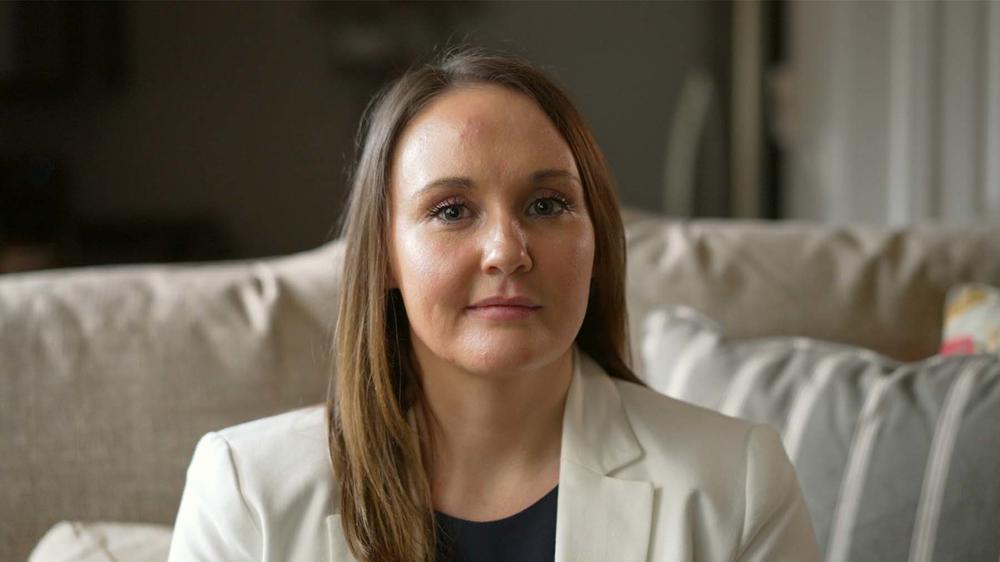
Caption
Cobb County fifth grade teacher Katie Rinderle was terminated in August 2023 for reading her students the book “My Shadow is Purple” by Scott Stuart.
Credit: Southern Poverty Law Center
LISTEN: A Cobb County teacher fired for reading a book to fifth graders that included a gender nonconforming character is suing the Cobb County School district. GPB's Peter Biello speaks with attorney Craig Goodmark about it.

Cobb County fifth grade teacher Katie Rinderle was terminated in August 2023 for reading her students the book “My Shadow is Purple” by Scott Stuart.
A Cobb County teacher fired for reading a book to fifth graders that included a gender nonconforming character is suing the Cobb County School district. Katie Rinderle, a current teacher and the Georgia Association of Educators all argue in the suit that the district’s policy is vague and its training on the policy is inadequate and therefore no teacher should be fired for violating it. Craig Goodmark is an attorney for the teachers. He spoke with GPB’s Peter Biello.
Peter Biello: The heart of the lawsuit is that the policy is vague, that there's no written definition that spells out what it means to be "divisive," "controversial," or "sensitive." Is it not within the rights of policy makers to use broad terms and then follow up later with a panel, who can then use their judgment to assess whether something fits those terms?
Craig Goodmark: When you're an educator and public educator like Katie Rinderle, Tonya Grimke, you have a right to your job. You have a property interest in your job. And if that property interest or your job is subject to being taken from you, you have to have fair warning as to why. The policies that Cobb County has passed — and certainly they are within their right to pass policies regarding things like curriculum, but those policies have to give fair warning to educators for things they can and cannot do.
Peter Biello: Meaning, if a school says that they don't want LGBTQ characters in books read aloud to children, they need to say as much before a teacher goes into a classroom with that book.
Craig Goodmark: A teacher needs to have notice before they can be fired for a violation of a policy. And policies like the censorship policies of Cobb County has passed don't provide that notice. Katie Rinderle, even when she was being investigated, had no idea what the scope of the terms "controversial," "sensitive" or "divisive" were. And so just on the facts of her situation alone, we see that there was no fair warning. There was no notice. These policies are vague.
Peter Biello: Katie Rinderle is one plaintiff. You mentioned the other, Tonya Grimke. She's suing in part because of this uncertainty and how the policy has impacted her ability to do her job. Can you tell me more about that?
Craig Goodmark: Tonya Grimke and the members of the Georgia Association of Educators that are working in Cobb County are teaching in fear. They don't know the limits of these policies. And they've seen this policy be enforced for illegal reasons. So they teach every day without understanding and without having been trained as to what the scope of these policies will be. And having now seen an educator be fired, that sense of fear and that chilling aspect of the policy is now stronger than ever.
Peter Biello: Overall, you're alleging that Cobb County has, by siding with the parents who argued that anything regarding those who identify as LGBTQ is divisive, they've effectively made discrimination against those people a matter of policy. What is the remedy you're seeking for that?
Craig Goodmark: We're seeking declaratory and injunctive relief. We want a judge to sit and read these policies and declare that they are unconstitutional because they do not give fair warning. We want a judge to declare that the actions taken against Katie Rinderle and enforcement of those policies constitutes sex discrimination, a violation of the equal protection clause of the 14th Amendment. It's critical that this Cobb County issue be elevated. Because justice wasn't handed out in Cobb County, we have to seek justice elsewhere.
Peter Biello: Overall, is what's happening in Cobb County part of a larger trend?
Craig Goodmark: Sure. I think the lawsuit itself is reflective of a larger trend in Georgia, which is ... outsiders, people outside of education, [are] creating an environment of fear for public educators. And the Georgia Association of Educators and the National Education Association are involved in this lawsuit because it's censorship policies like Cobb County that are being replicated across our state and that are chilling the ability of educators to do their job, which is, you know, as you know, Peter, one of the hardest jobs there is to be a public school teacher, and they've just made it that much harder.
GPB reached out to Cobb County Schools for comment. A spokesperson said, “While we have no comment on ongoing litigation, we're proud to be a district to be focused on the Georgia standards and what children need to know and do.”